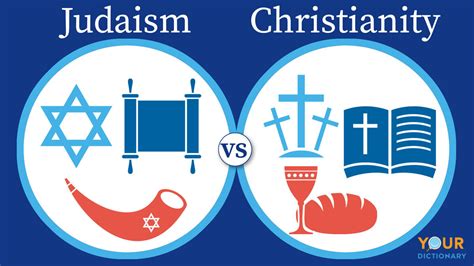Christianity and Judaism are two of the world's oldest and most influential monotheistic religions. Both share a common foundation, but they also have significant differences in their beliefs, practices, and histories. Understanding these differences can help foster greater respect, tolerance, and cooperation between Christians and Jews.
The shared roots of Christianity and Judaism lie in the Hebrew Bible, which is the sacred text of the Jewish faith. Christianity, however, also recognizes the New Testament as an integral part of its scripture. This divergence in scripture is just one of the many differences between the two faiths.

Key Differences in Beliefs
While both Christianity and Judaism believe in one God, their understandings of God's nature and relationship with humanity differ significantly.
God's Nature
In Judaism, God is understood as a single, indivisible entity, often referred to as the God of Abraham, Isaac, and Jacob. The concept of the Trinity, which is central to Christianity, is not recognized in Judaism.
Messiah
Another significant difference lies in the concept of the Messiah. In Judaism, the Messiah is expected to be a human figure who will bring peace and prosperity to the world. In contrast, Christians believe that Jesus Christ is the Messiah, the son of God, who has already come to redeem humanity.
Salvation
The path to salvation also differs between the two faiths. In Judaism, salvation is achieved through following the Torah, the first five books of the Hebrew Bible, and living a righteous life. In Christianity, salvation is believed to come through faith in Jesus Christ and acceptance of his sacrifice on the cross.
Differences in Practices
The practices of Christianity and Judaism also have distinct differences.
Worship
In Judaism, worship is centered around the synagogue, where prayers and readings from the Torah are conducted. In Christianity, worship is typically held in churches, where sermons, prayers, and sacraments are observed.
Observance of Laws
Judaism places great emphasis on observing the 613 commandments outlined in the Torah. Christianity, on the other hand, believes that faith in Jesus Christ has freed believers from the need to observe these laws.
Holy Days
The holy days observed by Christians and Jews also differ. Christians celebrate Christmas and Easter as their most significant holidays, while Jews observe Passover, Rosh Hashanah, and Yom Kippur as their most important festivals.

Differences in History
The histories of Christianity and Judaism are intertwined but distinct.
Early Christianity
Christianity emerged as a Jewish sect in the 1st century CE, with Jesus and his followers observing Jewish laws and traditions. However, as Christianity spread throughout the Mediterranean world, it developed distinct beliefs and practices that diverged from Judaism.
Persecution and Separation
Throughout history, Jews have faced persecution and violence, often at the hands of Christian rulers and societies. This legacy of persecution has contributed to the separation between the two faiths.
Modern Relations
In recent decades, there has been a growing movement towards reconciliation and dialogue between Christians and Jews. This has led to greater understanding and cooperation between the two faiths.






Conclusion
Christianity and Judaism are two distinct faiths with a shared foundation. Understanding their differences in beliefs, practices, and histories can foster greater respect, tolerance, and cooperation between Christians and Jews. As we move forward in a world where interfaith dialogue and cooperation are increasingly important, it is essential to appreciate and respect the unique traditions and values of both Christianity and Judaism.
What are the main differences between Christianity and Judaism?
+The main differences between Christianity and Judaism lie in their beliefs about God's nature, the concept of the Messiah, and the path to salvation.
What is the significance of the Trinity in Christianity?
+The Trinity is a central doctrine in Christianity, which holds that God is one being in three persons: the Father, the Son, and the Holy Spirit.
How do Christians and Jews observe their holy days?
+Christians celebrate Christmas and Easter as their most significant holidays, while Jews observe Passover, Rosh Hashanah, and Yom Kippur as their most important festivals.
